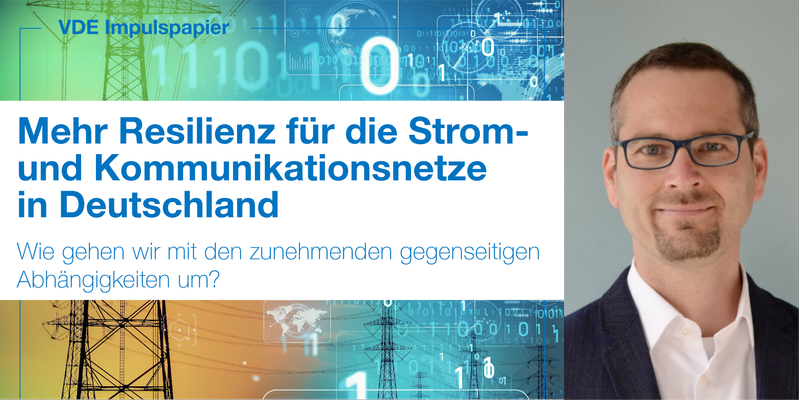Interdependencies of Electricity and Communication Networks
emergenCITY-PI Florian Steinke co-edits VDE impulse paper
emergenCITY-PI Florian Steinke co-edits VDE impulse paper

Almost constantly available electricity and communication networks are indispensable for Germany as a business location and a working everyday life. Hence, their resilience to crisis events such as natural disasters and cyber-attacks will become even more important in the coming years. But how do we deal with the increasing interdependencies of networks in Germany? Digitalization is dependent on stable communication networks, which in turn depend on a stable power supply. Can both infrastructures adequately absorb changes and disruptions in the other and recover? Or, on the contrary, do we have to expect a propagation of errors from the power grid to the communications network and vice versa?
emergenCITY-PI Florian Steinke, in interdisciplinary collaboration with expert groups from VDE ETG (Energietechnische Gesellschaft) and VDE ITG (Informationstechnische Gesellschaft), has co-written an impulse paper that focuses on these interdependencies between communication and electricity grids in Germany. Based on current and expected technical developments in electricity and communication networks, the researchers analyzed typical operating scenarios in normal operation mode and in the event of incidents and deduced from it the risks to the respective infrastructure and thus its resilience. In the end, the paper outlines four dimensions in which action needs to be taken, aimed at experts from industry, administration and politics.
Firstly, according to the six-member team of authors, the societal awareness of the unavoidable importance of more resilient electricity and communication networks needs to be raised. This also implies a common ground of willingness to bear additional costs, which will ultimately pay off by preventing outages and damage.
The impulse paper also emphasizes the need for cross-sector and cross-industry way of thinking and action: electricity grids and public communication services must be considered as linked systems - and the necessary skills to handle such interdependent systems must be developed among the experts involved from the operational, manufacturing and administrative areas.
As a third dimension, the research team emphasizes the increasing possibility of catastrophic events. These require measures that ensure the resilience of technical developments with regard to the expected risks in an appropriate and graduated manner. Finally, the team of researchers once again stresses the urgency of taking a joint perspective on the electricity and communication networks. Measures should be assessed, prioritized and finally planned and implemented in terms of their effectiveness, urgency and technical as well as economic feasibility.
The full VDE impulse paper is available here. If you have any further questions or in case you are interested in the topic, please contact Florian Steinke.
The VDE - Association for Electrical, Electronic & Information Technologies - is a network of employees, volunteer experts and companies and is based in Frankfurt am Main.